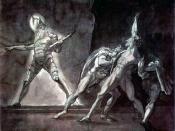The most important line in Hamlet is, 'The play's the thing, wherein I'll catch the conscience of the king.' (II, ii, 617). In the play, the issue of a clear conscience forms a key motif. When the conscience of the characters appears, it does so as a result of some action; as in the case of the aforementioned line, which follows Hamlet's conversation with the player. This line is of particular significance because it ties action and its effect on the conscience of the characters. The nature of Hamlet is conscience, and action plays an important role in creating the development of the plot.
No where is this development seen clearer than with Hamlet. The Prince's development comes as a result of the self-evaluation of the actions that have taken place, and the ensuing actions that he takes are a clear result of this self-evaluation. So, in essence, the actions cause him to think of his conscience and then act upon these feelings.
Hamlet's several soliloquies are a testament to this method. His first soliloquy, following a conversation with his recently wed mother and uncle reflect the uneasiness he feels. He feels betrayed. 'O, most wicked speed, to post, with such dexterity to incestuous sheets. . . but break my heart, for I must hold my tounge.' (I, ii, 156-159). Hamlet's conscience tells him what is wrong-in this case, the hasty marriage-but he is ambivalent as to how to approach it; before he meets the ghost, silence is his method. When Hamlet meets his father's ghost however, he feels sure of himself, and knows what he must do. As a result of the dialogue with the ghost, Hamlet's conscience makes him feel that revenge is the best method to deal with the problems that face him.
The consciences of Hamlet,


